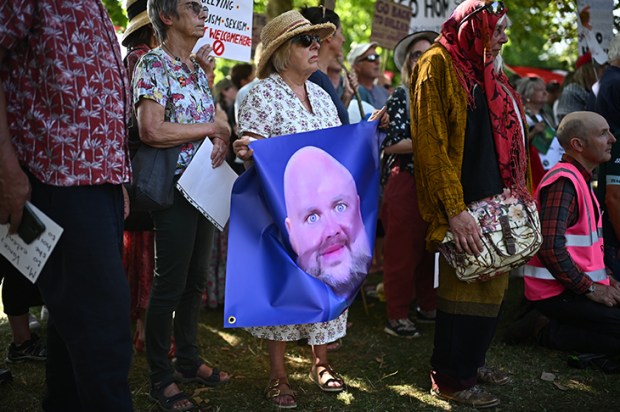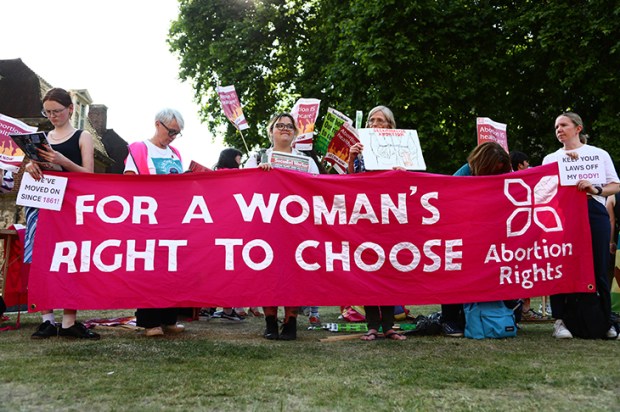I hope you had a good time during the holy month of Pride. 28 days of fasting in which you must go without morals or common sense. Having to praise sexually liberated wrong-uns without regard for biological reality, while flagellating oneself with a gigantic black dildo.
Don’t get me wrong, I’m all for standing up for what you believe in – I think protest is essential for keeping power in check and ensuring your voice is heard. But I am curious: what are they rebelling against? The world’s largest corporations support Pride, every government building flies the flag, and the US military paints rainbows on cruise missiles. Sticking it to the man? Give me a break!
Safe, predictable, and socially acceptable, Pride is no more than a fluffy pink road to adulthood, complete with depressing tax-paying and cholesterol-checking rituals. It’s time to put away the childish things and grow up.
There are several important and influential books that examine crowd psychology, but Eric Hoffer’s explanation of mass protests is a great starting point. He explained why mass movements appeal to their followers in The True Believer: Thoughts on the Nature of Mass Movements, written after the second world war. According to Hoffer, people join mass movements not because they want to advance themselves, but because they want to renounce themselves. A person most likely to take part in a mass movement is what he calls a true believer – an individual who is frustrated with life due to a lack of purpose and meaning, as well as feelings of rejection and isolation. Beliefs are less important to the true believer than escaping from the burden of the autonomous self. They do not desire freedom because that implies responsibility. A mass movement is the acquiescence of individual liberties to a power beyond one’s control.
All mass movements have been led by charismatic leaders who exploit their emotions and make them into cohesive units, typifying all protests throughout history. For a mass movement to succeed, it is essential to have a leader who can bring together true believers. Hoffer claimed that the most commonly used and efficient strategy is to instil animosity in the crowd by inventing a common enemy, real or imagined, whom the leader blames for all the issues that the true believers face. This collective resentment serves to unify the disorganised masses, as few things can form bonds as effectively as a common enemy.
This was something I observed during a recent Pride festival. For the record, as with most of these events, I was unaware it was taking place. When I went to get some cigarettes, I noticed that my road home was blocked. Call it fate or just plain dumb luck – I took the opportunity to do a little Gonzo journalism, Hunter S. Thompson style.
As I looked out across a sea of semi-naked leather-clad daddies twerking inches away from children, I noticed something. While this modern-day bacchanalia always attracts a fruity bunch, the majority of the attendees were young. And angry. The leader held a microphone and chanted ‘death to terfs’ and ‘F–k J.K. Rowling’ in a furious Pavlovian manner, which the throng repeated ad nauseam.
I understand the infectious energy surrounding demonstrations. As a young man, I attended numerous protests, most notably the massive march against the Iraq War in 2003. You meet like-minded folk who share your values and become engrossed in the drama, experiencing what Emile Durkheim called collective effervescence. However, going around in a ritualised fashion, shouting slogans and poorly veiled death threats at people you don’t like changes nothing about how power works. What it does, however, is more Machiavellian: it gives people the illusion of strength and power.
The Pride movement is facing an identity problem. Ironically, it lacks one of its own. Activists abandon their cultural traditions and adopt the identities of a more oppressed group. According to Hoffer, what connects all these movements is ‘interchangeability’. When it comes to activism, the young have bought into The Omnicause.™️ Greta Thunberg is a perfect example, having quickly dropped her climate change activism to pick up a keffiyeh in solidarity with Gaza. Whilst watching this demonstration I was struck by how many were holding Socialist Worker signs with a trans message on them – like a handkerchief dispenser they pull one off and write a slogan that fits the latest burning injustice. Today: Stop the Trans Genocide! Tomorrow, Nationalise oxygen, now!
Activism has changed little over the last three hundred years. The only difference is modern activists are predominantly white and middle-class. Pretending to be a revolutionary is the ultimate pre-packaged form of rebellion. Covered in organic hemp tote bags, pierced lips and patched jackets, they use activism as a replacement for a personality. It reminds me of the Ralph Waldo Emerson quote, ‘What you are speaks so loudly I can’t hear what you’re saying.’
There are hints of a backlash. Two trans-women netball players from Melton Netball Club in Victoria were recently barred from playing in the women’s league due their exceptional stamina and strength. In other words, they’re blokes. Then there’s medical transition. Adults are free to do as they wish, but carrying out these painful and irreversible surgeries on children, like mastectomies, will be seen as a terrible scientific mistake, similar to the old lobotomy procedure. There’s also the controversial debate about a possible connection to paedophilia. Recently Stephen Ireland the co-founder of Pride was given a 24-year prison sentence for raping a 12-year-old child.
While Trump’s executive orders have given woke a kicking, it’s far from dead. I am writing this on 6 July, otherwise known as Omnisexual Visibility Day. On 14 July it’s ‘International non-binary People’s Day’ which kicks off non-binary awareness week 14-20 July. It comes in the middle of International Drag Day, 16 July. That’s just this month. Wait for International Pronouns Day on 15 October! The commentariat believes woke has been put away. I shall let you be the judge of that.
Got something to add? Join the discussion and comment below.
You might disagree with half of it, but you’ll enjoy reading all of it. Try your first month for free, then just $2 a week for the remainder of your first year.













